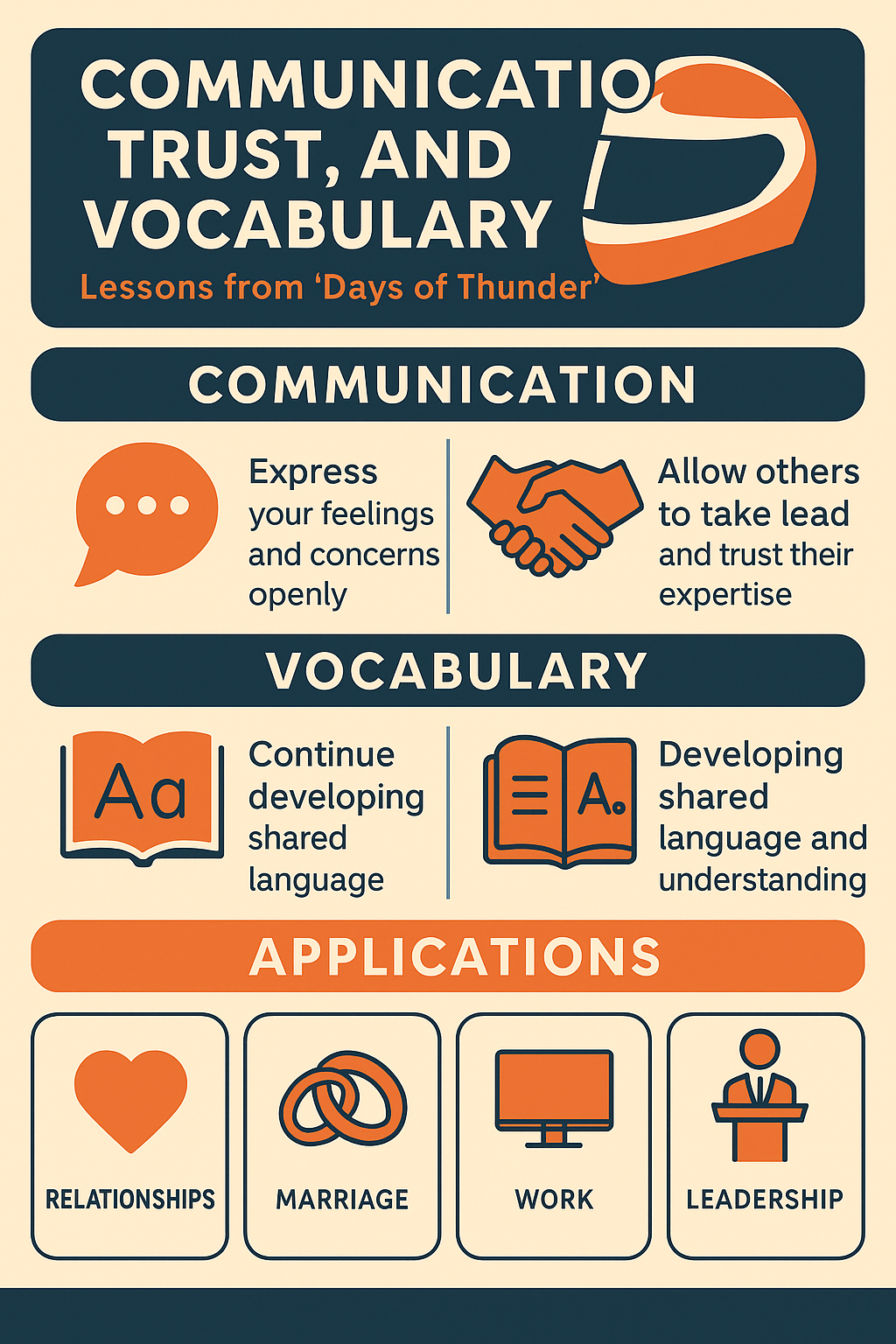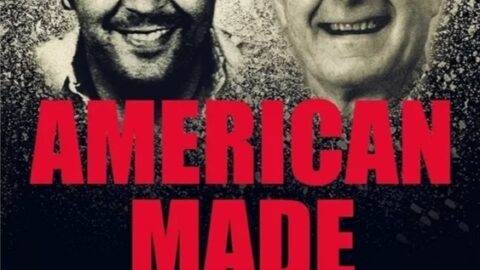In the movie Days of Thunder, there is a pivotal scene that highlights a timeless truth: failure in communication can cripple trust, cooperation, and success, even when both sides have the best intentions. This moment reveals a vital principle that applies beyond racing — to marriages, families, workplaces, governments, and everyday relationships.
Tim Daland – Everybody out, please… except you two. I’ve got a question: What is the one thing you need to do to win a race?
Harry Hogge – It’s pretty obvious…
Tim Daland – Quiet! You must finish the race.
Cole Trickle – Tim, I realize that Harry’s been around a long time. But I need a proper car that doesn’t blow engines.
Harry Hogge – If he didn’t over-rev the engine, it wouldn’t blow. Cole, when you shift the gear, – and the needle on the tach goes in the red and reads 9,000 rpm, that’s bad.
Cole Trickle – The tires blow, is that my fault?
Harry Hogge – Yes, it’s your fault. There’s other drivers out there who don’t use up their tires.
Cole Trickle – There’s nothing I can’t do with a race car.
Harry Hogge – There’s only so much I can do!
Cole Trickle – That’s obvious.
Tim Daland – Harry, he doesn’t need to appreciate your job to do his.
Harry Hogge – He has to know what a car can and can’t do!
Cole Trickle – You want me to work the pit and you drive?
Harry Hogge – I can’t talk to this son of a bitch. I can’t talk to that son of a bitch. I really can’t.
Tim Daland – You think he can drive? –
Harry Hogge – He can drive. He can drive beyond the limits of the car! If he’d listen to me, we’d never lose a race.
Tim Daland – If we don’t get a sponsor soon, my ass is fried. I’m liable to be out of the car business all together. Harry, I know you’re great. You know you’re great. But if the driver doesn’t trust you, we’re never going to win a race.
Next Scene:
Harry Hogge – We’ve got to talk.
Cole Trickle – All right, talk.
Harry Hogge – On the radio during the race… You’ve got to tell us what’s going on with the car.
Cole Trickle – You want to change the way I drive.
Harry Hogge – Maybe
Cole Trickle – Set up the car so I don’t have to change.
Harry Hogge – I’d be happy to. Tell me how.
Cole Trickle – What do you want to know?
Harry Hogge – Is she running loose or tight? A turn here, take some wedge out, we’ll win some races. That’s all there is to it
Cole Trickle – I can’t do that. I don’t know what the hell you’re talking about.
Harry Hogge – How do you mean that?
Cole Trickle – I don’t know much about cars.
Harry Hogge – Neither does any other driver.
Cole Trickle – No, I really don’t know. A turn here? A wedge there? I don’t know. I don’t know.
Harry Hogge – How can that be?
Cole Trickle – What’s the difference. They told me to get in a car and drive. I’d like to help out, but I can’t. I don’t have the vocabulary.
Harry Hogge – Well… we’re just going to have to figure one out. Don’t worry about it. All right?
Let’s dive deep into what this scene teaches us:
Skill and Trust Are Not Enough Without Communication
In the scene, both the driver (Cole) and the crew chief (Harry) are highly skilled. Both desire success. Yet, their mutual distrust and inability to communicate effectively cause continual failures.
In relationships, both people can love each other, or both team members can be committed to a goal, but without a common language to describe needs, limits, expectations, and struggles, miscommunication will fester distrust.
Example:
A husband and wife can both love each other deeply, yet if they don’t know how to express their fears, needs, or even simple logistical issues (like finances or parenting differences), misunderstandings grow into resentments.
The Lack of a Shared Vocabulary
Cole confesses something huge:
“I don’t know much about cars. I don’t have the vocabulary.”
He is skilled at driving but lacks the language to translate sensations into actionable feedback.
In relationships, the same dynamic often occurs.
Many people feel emotions (like frustration, insecurity, hurt) but lack the words to accurately express them. They know something is wrong but cannot explain it.
Result:
- Misinterpretation
- Unfair judgments
- Assumptions that worsen the gap
This happens because every relationship — romantic, professional, or familial — bridges two unique worlds, shaped by different upbringings, experiences, expectations, and even emotional “dialects.”
When Culture, Not Just Personality, Divides Us
Even within the same religion, same town, or same workplace, “culture” can vary.
- Family cultures (e.g., how conflict was handled at home)
- Emotional cultures (e.g., emotional suppression vs. open expression)
- Gender cultures (e.g., different ways men and women are taught to express emotions)
- Professional cultures (e.g., workers vs. management)
Each “culture” has its own language, and assuming the other person “should just know” leads to alienation.
Solution:
Both sides must work to learn each other’s “language” rather than blame each other for the misunderstanding.
Trust Requires the Will to Learn
Harry and Cole eventually agree:
“Well, we’re just going to have to figure one out.”
They realize learning to communicate is not optional — it is mission-critical to succeed.
Love, skill, and intentions are not enough.
Without the will to build a bridge of understanding, the relationship fails.
In marriage, friendships, and leadership:
- If you don’t understand the vocabulary of your spouse’s needs, you’re guessing at best.
- If a manager doesn’t learn the communication style of his team, he leads blindly.
- If policymakers don’t listen to the street-level concerns of law enforcement or teachers, rules become tyrannical and disconnected.
Bridging the Gap: How to Build a Shared Vocabulary
Here’s how relationships (of any kind) can bridge communication gaps:
| Step | Description |
|---|---|
| 1. Assume Goodwill | Start by believing the other is trying, even if they’re clumsy. |
| 2. Ask Clarifying Questions | Instead of assuming: “What do you mean by that?” or “Can you explain what you’re feeling?” |
| 3. Admit Your Own Limitations | Like Cole, be humble: “I don’t know how to explain this well.” |
| 4. Create Shared Language | Couples, teams, and families can create codes or analogies unique to them. (e.g., “Are we tight or loose today?”) |
| 5. Normalize Mistakes | People will misunderstand. Forgive and try again. |
| 6. Focus on the Intent, Not Just the Words | The heart behind the words often matters more than their precision. |
| 7. Practice Emotional Literacy | Especially in marriage, developing skills to describe emotions beyond “mad” or “happy” is crucial. |
Broader Lessons for Society
This principle also explains why governments and citizens, or rule-makers and enforcers, often clash.
- Laws are made, but the language and experience of policymakers differ from the lived experiences of citizens.
- Rules are handed down, but enforcers (e.g., police, teachers) work on the ground realities the lawmakers may not grasp.
Thus, deep listening, clear communication, and humility are critical for both groups to stay connected.
Without it?
The system falls into tyranny or anarchy.
Conclusion: Communication Is a Skill, Not an Accident
You don’t find great communication. You build it.
You don’t find the perfect vocabulary. You create it together.
Whether it’s love, family, work, or nation, the key to lasting success lies not just in good intentions, but in the shared bridge of understanding we’re willing to laboriously build together.







